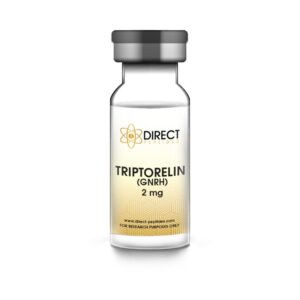Human chorionic gonadotropin (HCG) is mostly known for pregnancy tests, but its role in HCG in diagnostics is much bigger than that. HCG is a hormone made by the placenta during pregnancy, but it also helps doctors in many other areas, like fertility, cancer diagnostics, and checking hormonal health.
In this article, we will look at how HCG in diagnostics is used not only to confirm pregnancy but also to find problems like infertility, endocrine disorders, and some cancers.
HCG can warn doctors about health issues early, making it a very helpful tool for researchers and doctors working in research and clinical settings. HCG in diagnostics helps spot problems before they get worse, allowing doctors to act early and improve their tests.
One of the most well-established uses of HCG is in the diagnosis of fertility issues. In both men and women, HCG levels provide essential information about reproductive health. For women undergoing fertility treatments, HCG injections are often used to stimulate ovulation, helping eggs mature and become ready for fertilization. This is particularly important in assisted reproductive technologies (ART) like in vitro fertilization (IVF).
The measurement of HCG levels is also critical in diagnosing infertility issues. Low HCG levels may indicate that the ovaries are not producing enough eggs, or that there is an issue with ovulation.
Monitoring HCG helps doctors track the success of fertility treatments and provide the right interventions when necessary. Similarly, in men, HCG can help assess testicular function, aiding in the diagnosis of hypogonadism or other reproductive disorders.
Once pregnancy occurs, HCG levels continue to play a pivotal role in monitoring the health and progression of the pregnancy.
Discover HCG from Direct Peptides Luxembourg, a hormone used in research for fertility diagnostics and pregnancy monitoring, providing valuable insights into hormonal health.
 After conception, HCG levels go up quickly and are one of the first signs of a healthy pregnancy. HCG testing is often used early in pregnancy to make sure everything is going well.
After conception, HCG levels go up quickly and are one of the first signs of a healthy pregnancy. HCG testing is often used early in pregnancy to make sure everything is going well.
Low levels of HCG might mean the pregnancy is not in the right place (like an ectopic pregnancy) or there might be a risk of miscarriage, which needs immediate care.
In cases of multiple pregnancies, like twins or triplets, HCG levels can be higher than usual. This helps doctors find out about these pregnancies early. Checking HCG levels during the first few months is very important for doctors to make sure the pregnancy is healthy and going as expected.
HCG doesn’t just help confirm pregnancy; it can also show hormonal imbalances that could affect the pregnancy. If HCG levels are too low or too high, it could be a sign of problems like gestational trophoblastic disease or molar pregnancy, which need special care. Catching these issues early can help keep both the mother and baby safe.
Beyond confirming pregnancy, monitoring HCG levels can reveal a lot about the hormonal balance crucial to the pregnancy’s success.
Explore Peptide Supplies at Direct Peptides Luxembourg for all your reconstitution requirements.
HCG testing is also an important way to find hormonal imbalances. The pituitary gland in the brain controls many hormones, including those that affect HCG production. If the pituitary is not working right, it can cause hormonal imbalances, and HCG levels can show if something is wrong.
For example, low HCG levels can help doctors diagnose conditions like hypopituitarism, where the pituitary doesn’t make enough hormones. HCG can also help doctors see if there are problems with gonadal function (the ovaries in women and the testes in men), which is important for reproduction and overall health.
By testing HCG along with other hormones, doctors can figure out if there are issues with fertility or metabolic health. If HCG levels are unusual, it may be a sign to do more tests to figure out what’s causing the imbalance.
Abnormal HCG levels can also help doctors find more serious problems, like certain cancers. Cancers such as testicular cancer, ovarian cancer, and choriocarcinoma can cause high HCG levels.
 While most people associate HCG with pregnancy, this peptide also plays a vital role in cancer diagnostics. Certain cancers, like testicular cancer, ovarian cancer, and choriocarcinoma, are known to cause elevated HCG levels.
While most people associate HCG with pregnancy, this peptide also plays a vital role in cancer diagnostics. Certain cancers, like testicular cancer, ovarian cancer, and choriocarcinoma, are known to cause elevated HCG levels.
This makes HCG a powerful tumor marker for these specific types of cancer.
For example, testicular cancer often leads to elevated HCG levels, and monitoring these levels can provide early warnings of cancer before symptoms appear.
In cases of ovarian cancer, HCG testing can also help identify the presence of tumors. By tracking HCG levels, doctors can detect cancer earlier, when treatment options are more likely to be successful.
In addition, HCG levels are also used to monitor how well cancer treatments are working.
A decrease in HCG levels could indicate that the treatment is effective and that the tumor is shrinking, while rising levels may suggest that the cancer is progressing or recurring.
While HCG’s role in cancer detection is a critical application, this hormone is perhaps best known for its function in reproductive health. HCG levels are routinely measured to assess the health of the reproductive system, especially in individuals undergoing fertility treatments.
In women, HCG testing helps doctors monitor ovulation and egg maturation. HCG injections are often used to trigger ovulation, and HCG testing ensures that the eggs are released at the optimal time for fertilization.
For men, HCG testing is used to assess testicular function and sperm production, which are essential components of male fertility. Low HCG levels in men may signal issues with the testes, such as hypogonadism, where the testes are not producing enough testosterone.
In both cases, HCG provides important feedback on gonadal function and plays a crucial role in diagnosing and treating fertility issues early on. Beyond fertility, HCG is also used to monitor hormonal health, which is essential for overall well-being.
 The pituitary gland plays a key role in regulating many of the hormones in the body, including those involved in reproductive health. By measuring HCG levels, doctors can gain insights into how well the pituitary is functioning.
The pituitary gland plays a key role in regulating many of the hormones in the body, including those involved in reproductive health. By measuring HCG levels, doctors can gain insights into how well the pituitary is functioning.
If the pituitary gland is not producing sufficient hormones, HCG testing can help identify the issue, leading to a diagnosis of hypopituitarism or other endocrine disorders.
In women, HCG testing is often used alongside other hormone tests to assess ovarian reserve and identify conditions like Polycystic Ovary Syndrome (PCOS). PCOS can lead to abnormal HCG levels, and HCG testing helps doctors diagnose this condition early, allowing for better treatment planning.
In men, HCG testing is also helpful in diagnosing low testosterone levels and other gonadal dysfunctions, which are common causes of male infertility. Whether diagnosing reproductive health issues or endocrine disorders, HCG in diagnostics is crucial for understanding the body’s hormonal health.
While HCG is an essential peptide in fertility diagnostics and the monitoring of hormonal health, other peptides like Gonadorelin and Triptorelin are also used in various diagnostic applications.
 Gonadorelin is a synthetic peptide that stimulates the release of luteinizing hormone (LH) and follicle-stimulating hormone (FSH), two key hormones involved in ovulation and sperm production.
Gonadorelin is a synthetic peptide that stimulates the release of luteinizing hormone (LH) and follicle-stimulating hormone (FSH), two key hormones involved in ovulation and sperm production.
Gonadorelin is used in fertility diagnostics to evaluate the function of the hypothalamic-pituitary-gonadal axis, which is responsible for regulating reproductive health.
In women, Gonadorelin helps assess ovarian function by stimulating the release of FSH and LH. In men, Gonadorelin can help assess testicular function and provide insights into sperm production. Together with HCG, Gonadorelin provides a clearer picture of a person’s fertility health.
Explore Gonadorelin from Direct Peptides Luxembourg, a peptide that stimulates the release of vital hormones for assessing reproductive function and evaluating fertility in research.
 Triptorelin, another synthetic GnRH analogue, plays a role in the treatment of endometriosis, prostate cancer, and precocious puberty. By suppressing gonadotropin release, Triptorelin helps regulate hormone levels and manage symptoms in these conditions.
Triptorelin, another synthetic GnRH analogue, plays a role in the treatment of endometriosis, prostate cancer, and precocious puberty. By suppressing gonadotropin release, Triptorelin helps regulate hormone levels and manage symptoms in these conditions.
In fertility diagnostics, Triptorelin is used to control ovarian stimulation during IVF, helping to manage the hormonal responses in women.
For men undergoing cancer treatment, Triptorelin can help lower testosterone levels, which is often necessary to slow the progression of hormone-sensitive cancers. By using Triptorelin alongside HCG, doctors can more effectively manage hormonal treatments and fertility care.
Check out Triptorelin from Direct Peptides Luxembourg, a peptide used in research for managing hormone-sensitive conditions and regulating reproductive health.
Looking ahead, the role of HCG in diagnostics is expected to grow as research continues. HCG testing is already an essential tool in fertility diagnostics, cancer detection, and hormonal health monitoring, but there is potential for it to be used in even more areas of medicine.
Emerging research suggests that HCG testing could be expanded to help diagnose metabolic diseases, autoimmune conditions, and endocrine disorders. As diagnostic techniques improve, HCG in diagnostics will likely play a more central role in early disease detection and personalized medicine.
HCG in diagnostics has a broader role in medicine than just confirming pregnancy. From its use in fertility research to hormonal health studies and cancer detection, HCG is essential in the research world.
The value of HCG testing extends beyond just patient care and provides researchers with critical data on fertility, hormonal disorders, and cancer that will ultimately improve treatment options and patient outcomes.
While HCG is not typically used in general clinical practice for human treatment, it remains a cornerstone of scientific research, helping to shape better diagnostic tools and therapies for various conditions. Through ongoing research, the role of HCG in diagnostics will continue to evolve, offering early detection and personalized medicine for a wide range of health issues.
Shop ALL Pre-Mixed Peptide Pens for research from Direct Peptides Luxembourg online today.
[1] Cole LA. New discoveries on the biology and detection of human chorionic gonadotropin. Reprod Biol Endocrinol. 2009 Jan 26;7:8.
[2] Stenman UH, Tiitinen A, Alfthan H, Valmu L. The classification, functions and clinical use of different isoforms of HCG. Hum Reprod Update. 2006 Nov-Dec;12(6):769-84.
[3] Stenman UH, Alfthan H, Hotakainen K. Human chorionic gonadotropin in cancer. Clin Biochem. 2004 Jul;37(7):549-61.
[4] Ab Rahim SN, Omar J, Tuan Ismail TS. Gonadotropin-releasing hormone stimulation test and diagnostic cutoff in precocious puberty: a mini review. Ann Pediatr Endocrinol Metab. 2020 Sep;25(3):152-155.
[5] Kumari R, Muneshwar KN, Pathade AG, Yelne S. Unveiling the Effects of Triptorelin on Endocrine Profiles: Insights From Healthy, Polycystic Ovary Syndrome, and Hypothalamic Amenorrhea Women. Cureus. 2023 Sep 5;15(9):e44752.

TWIN PACKS
HCG Peptide Vial
£19.76 – £51.26Price range: £19.76 through £51.26 Select options This product has multiple variants. The options may be chosen on the product page
HCG Nasal Spray
£34.24 – £63.48Price range: £34.24 through £63.48 Select options This product has multiple variants. The options may be chosen on the product page
Gonadorelin Pre-Mixed Pen 2mg
£14.96 – £41.96Price range: £14.96 through £41.96 Select options This product has multiple variants. The options may be chosen on the product page
Triptorelin Peptide Vial
£15.74 – £24.72Price range: £15.74 through £24.72 Select options This product has multiple variants. The options may be chosen on the product pageALL CONTENT AND PRODUCT INFORMATION AVAILABLE ON THIS WEBSITE IS FOR EDUCATIONAL PURPOSES ONLY.
DISCLAIMER: These products are intended solely as a research chemical only. This classification allows for their use only for research development and laboratory studies. The information available on our Luxembourg Direct Peptides website: https://direct-peptides.com is provided for educational purposes only. These products are not for human or animal use or consumption in any manner. Handling of these products should be limited to suitably qualified professionals. They are not to be classified as a drug, food, cosmetic, or medicinal product and must not be mislabelled or used as such.